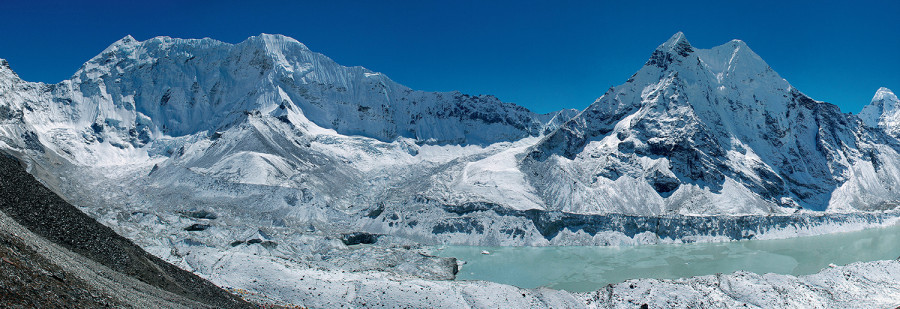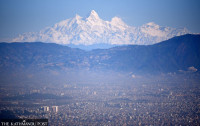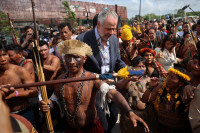Climate & Environment
Why Nepal is not on the list of invitees for climate summit called by Joe Biden
The country has failed to demonstrate its actions to mitigate impacts and make concerted efforts to show its vulnerabilities before the world despite bearing the brunt.
Chandan Kumar Mandal & Anil Giri
American President Joe Biden last month invited world leaders, including Presidents Vladimir Putin of Russia and Xi Jinping of China, to a virtual summit on climate change. At least three leaders from South Asia–Prime Minister Narendra Modi of India, Sheikh Hasina of Bangladesh and Lotay Tshering of Bhutan have also been invited. Nepal is not on the list of invitees.
It was widely expected that Nepal would be among the countries to be invited because of the climate vulnerability it faces and the brunt of the climate change it has to bear, for which its role is negligible, and the impacts the country is going to face in the future because of the climate crisis.
While some see Nepal’s exclusion as a diplomatic failure of the government, others say there is no need to make a hue and cry over the US not extending an invitation to the climate summit.
Nepal should have been able to ensure its participation as it has been leading several initiatives related to climate change in the past and the government is also planning to hold Sagarmatha Sambad, a multi-stakeholder dialogue forum committed to deliberating on the most prominent issues of global, regional and national significance including climate change, according to some former diplomats.
“There are some reasons why Nepal has been excluded,” said Durga Bhattarai, a former foreign secretary who has also served as Nepal’s permanent representative to the United Nations.
“Internationally, we are not leading any climate change related issues,” Bhattarai told the Post. “Bhutan and Bangladesh, on the other hand, have made significant and visible contributions.”
Climate change experts also say Nepal should have been able to demonstrate its vulnerability and efforts it is making to mitigate climate change impacts so as to get a seat in the Biden-called climate summit, which is scheduled for April 22-23.
According to Raju Pandit Chhetri, a climate change expert and executive director of Prakriti Resources Centre, a non-governmental organisation working for sustainable development and environmental justice in Nepal, only big emitters and major climate change partner countries have been invited to the event.
“It’s natural for us to feel that we should have been invited. That Nepal has not been invited is not a big issue though,” Chhetri, who has been involved in international climate negotiations for several years, told the Post. “What is important is that the United States is now sending a positive signal by calling such a summit on climate change, which never became the White House’s priority during Donald Trump’s four years.”
Hours after being sworn in as US president, Biden on January 20 had reinstated the US to the Paris climate agreement. The US had become the first country in the world to pull out of the Paris agreement in November last year during the fag end of the Trump presidency.
“It was unfortunate that the US had withdrawn from the Paris agreement. Now, the US, which is also one of the major emitters, taking leadership shows climate change is gaining political momentum too,” said Chhetri.
Nepal ranks fourth in terms of climate risk, according to the Global Climate Risk Index that analyses to what extent countries and regions have been affected by the impacts of weather-related events. An analysis of data on extreme weather events between 1999 and 2018 ranked Nepal ninth among the 10 countries most affected by extreme weather events. Such rankings for Nepal indicate that the country could be hit by natural calamities anytime, leaving it fending for itself.
Studies suggest millions of people could be affected due to climate change impacts vis-a-vis reductions in agricultural production, food insecurity, drying of water resources, and loss of forests and biodiversity, among others.
According to Uttam Babu Shrestha, director at the Global Institute of Interdisciplinary Studies, a think tank based in Kathmandu, when the US, which itself is a key player in global climate change issue, is organising such a summit, Nepal should have been among the invitee nations as one of the climate change vulnerable countries.
“Nepal would have had an opportunity to share its experiences before the global leaders,” said Shrestha.
Some experts, however, say the climate summit is a symbolic gesture and that Nepal should rather focus on demonstrating how it is suffering and what all it has been doing so as to seek more support to tackle the climate change-induced crisis.
According to Chhetri, Nepal has not been able to show the kind of climate actions Bangladesh, a country severely affected by the climate crisis, has done over the years.
“Bangladesh has been a champion of climate change at home, and at regional and international levels. Nepal has not shown such a response, especially on the climate adaptation part,” said Chhetri. “They are the frontrunner at home and outside. Their climate action is commendable.”
Similarly, according to Chhetri, India has been invited because it is one of the largest economies and a major emitter of greenhouse gases.
“India is a growing economy and a global economic player. Therefore, they deserved the place,” said Chhetri. “Bhutan is currently the head of LDC group so it has been invited with that status.”
The LDC Group is made up of the 47 poorest countries in the world, which contribute the least to the cause of climate change, but disproportionately suffer from its ever-increasing impacts.
Pakistan, yet another South Asian country whose vulnerability to climate change is also immense, has also not been invited to the summit, and this has caused an outrage among Pakistanis. The issue has garnered massive media coverage, asserting that it should have been invited to the event for its climate actions like plantation drive among others.
Even Pakistani Prime Minister Imran Khan expressed his surprise, saying he was puzzled over Pakistan not being invited to the climate change conference.
That there has not been an outrage like situation in Nepal is also because of lack of awareness in the country on climate change issues, say experts. According to them, Nepal, however, must continue to make concerted efforts to draw the developed countries’ attention to the brunt it has to bear because of them.
“Bangladesh has been vocal for nearly 20-25 years about the impacts of climate change on the country and actions they have taken to address the crises,” said Manjeet Dhakal, another climate change expert.
Dhakal said he is not surprised why Nepal is not among the 40 countries invited to the climate event.
“Why not Nepal? Because it’s neither a major economy nor it can make a significant influence in negotiations,” Dhakal, who currently serves as an advisor to Least Developed Countries (LDCs) chair at the UN Climate Change, told the Post. “For now, Bhutan, which currently chairs LDC group, will speak on behalf of Nepal too.”
According to Dhakal, Japan-Brazil Dialogue, which took place in February, also did not invite Nepal as a participant. Likewise, Germany every year organises Petersburg Climate Dialogue, but Nepal was not invited to the 12th edition of the event. Nepal was not on the list of invitees of the 5th session of the Ministerial on Climate Action (MOCA), co-convened by China, the European Union and Canada.
“We need international support because we are vulnerable. However, we also need to be able to demonstrate before the world community that we are indeed doing something,” said Dhakal. “For drawing international attention and securing invitations to such events, we have to work like Bangladesh and Costa Rica and showcase our efforts. There are areas where Nepal can work in its fight against climate change.”
Chhetri agrees that Nepal, which is experiencing climate change impacts, has areas where it can collect evidence of impacts felt by the country.
“In the plains, there are floods every year. In the hilly region, we experience landslides, forest fires and droughts and in the mountains, glaciers are melting faster. These impacts are the backdrops against which Nepal can champion the cause of the climate change debate,” said Chhetri. “Every country is somehow affected by climate change. If Nepal considers it deserves to be invited, then it needs to seriously advocate for our issues and actions.”
Based on climate vulnerabilities, experts like Shrestha still argue that Nepal should have been invited to the summit for its climate change experiences that are different from other countries.
“Our climate change experience might be similar to Bhutan to some extent. However, India and Bangladesh have their unique climate change issues – different from Nepal,” said Shrestha. “If Pacific Island countries and some ASEAN countries get invited then Nepal should have also been on the list as mountainous countries experiencing climate effects.”
According to Shrestha, unlike other mountainous countries of the region invited to the summit, Nepal has more peaks above 8,000 metres and could be experiencing harsher impacts in the future.
“Nepal itself is also organising Sagarmatha Sambad to draw the attention of the international community and showcase itself as an affected mountainous country,” said Shrestha. “Besides, the US is also one of the key development partners for Nepal. Hence, an invitation to such a crucial summit would have been beneficial for Nepal.”
The US Embassy in Kathmandu said that under President Biden and Secretary of State Antony Blinken, climate change has become an essential element of Washington’s foreign policy.
“We know Nepal has been a leader on this issue and we look forward to working together to combat the climate crisis for the sake of our shared future…,” said Anna Richey-Allen, spokesperson for the US embassy, in an email response on Nepal’s exclusion from the climate summit. “We stand ready to partner with Nepal on climate issues, including our attendance at the Sagarmatha Sambad when it is organised.”




 13.12°C Kathmandu
13.12°C Kathmandu












